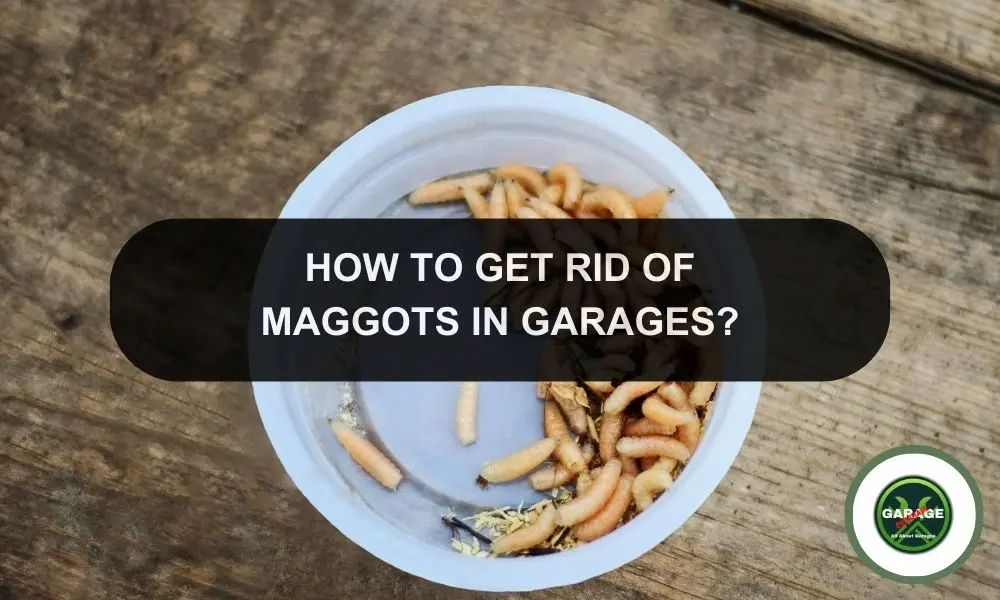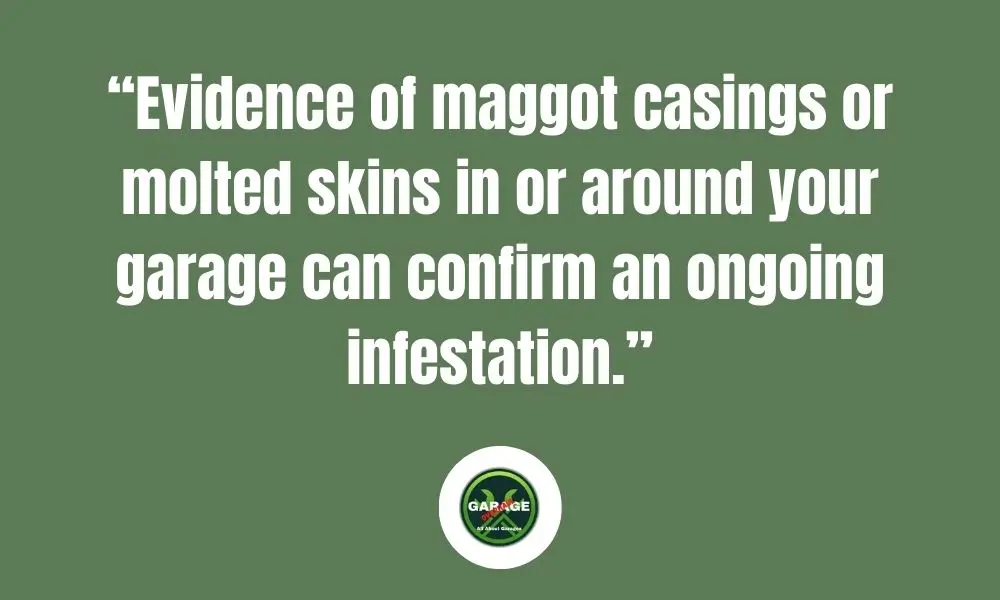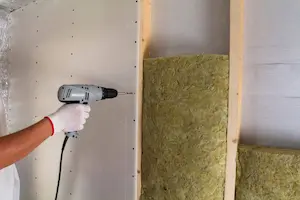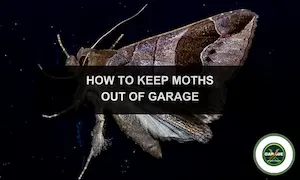How To Control And Get Rid of Maggots In Garage
This post contains affiliate links.
This post contains affiliate links.

Maggots are disgusting, and they smell so bad that they may make you gag. Unfortunately, you may encounter them in your garage, especially if you do not regularly keep it clean. How do you get rid of maggots in garage?
You can remove maggots in garages by:
- Applying hot water or vinegar
- Clean and sanitize your garage from any organic materials
- Seal up cracks and entry points for flies
- Use Diatomaceous earth
This post explores how you can control and eliminate maggots in garage. We also look at why you have the problem in the first place and the possible types of maggots you may encounter.
What Are Maggots Really?
Maggots are essentially the larval stage of various fly species from the Brachycera tree, such as:
- house flies
- fruit flies, or
- blowflies.

When you spot these tiny cream-colored worms, it’s a sign of decay or rot nearby, as maggots thrive on decomposing organic matter.
They find a haven in garages due to the abundance of food sources, like trash in garbage bins or even a dead animal unnoticed in a corner. Adult flies are attracted to these spots to lay their eggs, which hatch into larvae.
These larvae can become a pest problem if not addressed. They’re known to quickly infest areas, leading to a larger maggot infestation.
Why Maggots Love Garages
Here’s a fact: garages often become unintended havens for maggots, those tiny cream-colored larvae that can turn into a full-blown pest infestation before you know it.
Understanding why maggots choose garages for nesting can help you prevent them from taking over.
Food Source
Garages offer a buffet of decaying organic matter, a primary attraction for maggots. Old trash cans and neglected garbage bins become prime real estate for these pests.
Flies, drawn to the scent of decay, lay their eggs here, and soon, larvae emerge, thriving on the rot.
The issue escalates when there’s unnoticed organic material lying around, like a dead animal or forgotten waste. This attracts adult flies to lay their eggs and supports the life cycle of maggots, allowing them to feast and grow.
Your Garage Has Holes
Cracks and crevices within the garage structure provide the perfect shelter for these larvae.
Maggots and flies seek out these hidden nooks to lay eggs away from prying eyes. Identifying and sealing these entry points is crucial for maggot control.
Perfect Temperature And Humidity Level
Beyond the allure of decaying organic material and sheltered nooks, garages often provide an ideal temperature and humidity level that flies find irresistible for laying their eggs.
Unlike the fluctuating conditions outside, a garage can offer a stable environment that protects delicate maggot eggs from harsh weather, increasing their chances of survival.

This steady climate allows the eggs to develop into maggots undisturbed, turning your garage into a nursery for these pests. If you regulate the temperature in your garage using coolers and heaters, this wormy crawlies love it even more.
Safe Space, Without Predators
Another factor you’ll see maggots in garages is the lack of natural predators in the enclosed garage space. Outdoors, larvae and their eggs are at risk from a variety of predators, including:
- birds
- insects, and
- raccoons.
However, in the safety of a garage, these natural checks are absent, allowing larvae to grow in numbers without threat. This safety net makes garages a hotspot for flies to lay their eggs, confident in the next generation’s survival.
Common Types Of Worms And Maggots In Garages
Here are some of the more common maggots you may encounter in your garage:
Housefly Maggots: Likely the most common you’ll see. These tiny, cream-colored worms emerge from eggs laid by adult houseflies, often found around trash cans or decaying organic matter.
Blowfly Maggots: Unlike housefly larvae, they are larger and often have a metallic sheen. These maggots prefer decaying meat or dead animals, so removing any deceased rodents or birds is crucial.
Fruit Fly Maggots: You may see them near fermenting fruits or vegetables. While less common, they indicate that compost or organic waste isn’t properly managed.
Fungus Gnat Larvae: You might find these maggots in overwatered plant soil. If you store garden supplies indoors, you will likely see them in your garage. These grubs are smaller and thrive in moist environments.
Grain Fly Maggots: If you have drainage problems, you’ll see them. These maggots enjoy standing water or damp areas in your garage, living in the slimy film that develops in drains or under leaky water pipes.
How To Know If You Have A Maggot Problem?
Here are seven signs that may indicate you’re facing a maggot infestation:
You See Them With Your Own Eyes
If you notice tiny cream-colored worms crawling around your garage, particularly near trash cans or any organic waste, you’ve likely spotted maggots. These larvae are known for their wriggling movement and can often be found in clusters.
Fly Activities
An increase in fly activity around your garage is another red flag. Adult flies are attracted to decaying material to lay their eggs, which hatch into larvae.
Seeing an unusual number of flies hovering around garbage bins can suggest a maggot problem. Even if there’s none, it’s a matter of time before maggots emerge.
Foul Odor
A foul odor emanating from corners or hidden spots in your garage can indicate decay, a primary attractant for flies to lay their eggs.
This smell is often a sign of an advanced stage of infestation. Aside from the smell of the maggots, the odor may also come from decaying organic matter.
There’s Decaying Organic Matter
Suppose you find decaying organic matter, such as forgotten food waste or even a dead animal. In that case, this is a direct food source for maggots and can explain their presence. Maggots thrive on rot and decay.
Get rid of it, and heavily sanitize the area before flies discover it and lay their eggs. Do it late, and you’ll have maggots to deal with.
You See Maggot Eggs
If you spot maggot eggs, you can confirm that you have a maggot problem. Maggot eggs are usually:
- tiny,
- white in color and
- laid in clusters.
These eggs hatch into larvae, exacerbating the problem. Remove them before it’s too late.
You See Maggot Casings Or Molted Skins
Evidence of maggot casings or molted skins can confirm an ongoing infestation. As maggots grow, they shed their skins, leaving evidence of their presence.

Incomplete Sanitization Jobs
If you’ve recently removed decay or water from your garage, you are at risk of maggot infestation. This is even more likely if you did not completely sanitize the area or completely remove the matter.
This environment is conducive to maggot growth. Bacteria from decaying organic material create a perfect ground for flies to lay their eggs and breed, leading to maggots.
How To Get Rid Of Maggots In Your Garage?
Discovering maggots in your garage can be an unsettling experience. Fortunately, many effective ways to rid your space of these unwelcome guests exist.
Eliminate The Source
Identify the source of the maggots. This could be garbage cans that haven’t been cleaned or a dead animal hidden away.
Removing this source is crucial to prevent further maggot development. After the source is gone, thoroughly clean the area to eliminate any remaining eggs or larvae.
Boil Em’
Hot, boiling water is an effective method to kill maggots on contact. Pour it over any maggot-infested area in your garage, and watch them cook.
Be cautious with this method, as boiling water can damage certain surfaces. You also want to protect your skin from possible scalding.
Insecticides
Insecticides designed for maggot control can also be effective. Products containing permethrin (paid link) can be applied with a pump sprayer to targeted areas, ensuring the chemicals reach cracks and crevices where maggots might hide.
Always follow the product’s instructions to ensure safety and effectiveness. These are, after all, poisonous materials. Also, ensure you can store them safely, away from the reach of children and pets.
Vinegar Works Too
With its strong acidity, vinegar can be an eco-friendly option to kill maggots. You may find using vinegar more comfortable than insecticides.
Mix equal parts vinegar and water. Then, spray it directly onto the maggots or areas where they are found. This solution not only kills maggots but also disinfects the area. One issue with vinegar is the smell, but it should go away after a bit.
Use Diatomaceous Earth
Another approach involves using diatomaceous earth,(paid link) a natural pest control powder that dehydrates and kills maggots upon contact.
Sprinkle it around your garage, focusing on problem areas and potential entry points. Then, watch it work and kill these maggots.
Keep Your Garage And Surroundings Clean
Maintaining cleanliness is key to preventing maggot infestations. Regularly take out the trash, clean the bin and ensure that garbage bins are sealed properly.
Cleaning up spills or residues, especially from organic materials, will deter flies from laying eggs. It may also help to reduce eating in your garage.
Food crumbs or drink spills could be a food source for these maggots to thrive.
Seal Up Your Garage
Sealing up any holes in the walls or gaps around doors can prevent adult flies from entering your garage to lay eggs. Regular inspections are important here.
Sealable with caulk or weather stripping once you have identified potential entry points. This may just be your best defense and can make a significant difference in your war against maggots and flies.
Maggots In Garage: A Controllable Issue
Conquering a maggot infestation in your garage hinges on diligence and the right strategies. From identifying the source to employing removal methods, you can get rid of them.
By combining these tactics, you can get rid of maggots in garages, ensuring they remain a clean and pest-free space for your belongings and activities.
Check out comprehensive guides on how to get rid of other garage pests here!






